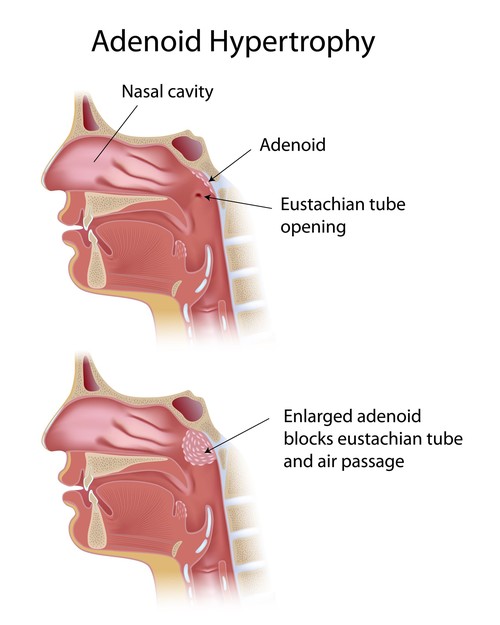
Contents
In this article, we will take a look at:
- What is Adenoiditis?
- How does Adenoiditis occur?
- Who is prone to Adenoiditis?
- Symptoms of Adenoiditis
- Diagnosis of Adenoiditis
- Complications of Adenoiditis
- Treatment for Adenoiditis
You can click on any of the links above to navigate to the section of your interest.
What is adenoiditis?
Adenoiditis is the condition wherein the adenoids get inflamed and enlarged after getting infected, resulting in problems like respiratory infections and difficulty in breathing. Adenoids are a plot of tissue, located in the higher part of the throat. They, along with the tonsils, help in clearing the infections and balancing the body fluids. Adenoids also help in fighting the infections in the body by producing antibodies.
Adenoiditis or an enlarged adenoid is a common problem in children. It is a condition where adenoids are swollen. It might affect nose, lips and the mouth of the affected person. It might lead to difficulty in breathing as well, which might lead to breathing from the mouth and resulting in cracked lips, running nose and a bad breath.
How does adenoiditis occur?
Adenoiditis usually occurs due to infection in the adenoids. However, several other reasons might also contribute to the swelling up of adenoids, like when the tissues are fighting with any kind of infection. Some children are born with enlarged adenoids, which generally start to shrink after five years of age. If the adenoids remain swollen for a prolonged period, then it can be a problematic situation.
Who is prone to adenoiditis?
You could be at the risk of developing adenoiditis if:
- You are below twelve years of age
- You have infection near the nose or throat
- You have any kind of allergy
- You are sick
- You have suffered from swelling in the adenoids since birth
What are the symptoms of adenoiditis? How is adenoiditis diagnosed?
The symptoms of adenoiditis include:
- Stuffy and blocked nose
- Ear problems
- Sore throat
- Snoring
- Sleep disorder
- Cracked lips
- Difficulty in swallowing
- Swollen neck glands
- Glue ear
- Dry mouth
- Sleep apnea
- Ear pain and infections
Diagnosis
After suspecting adenoiditis, the doctor might conduct a thorough check-up of the ears, throat, neck and mouth to get an accurate idea of the situation. The doctor might suggest X- ray to see the exact damage caused. He might use a special instrument to check the size of adenoids.
What are the complications of adenoiditis?
If diagnosed at the right time, enlarged adenoids do not create much of a problem. A timely treatment can cure the problem and it might subside gradually too. Some of the complications caused by untreated adenoiditis include:
- Breathing through the mouth
- Speaking with a nasal tone
- Runny nose
- Bad breath
- Dry mouth
- Loud breathing
What is the treatment for adenoiditis?
The correct treatment for adenoiditis can be devised based on the reason for swelling up of the adenoids. In the case of mild symptoms, the doctor might not start any treatment. If the doctor suspects any bacterial infection, then he might provide nasal sprays or antibiotics to reduce the swelling. Certain medications like nasal steroid can be suggested or given to shrink the enlarged adenoids. If medications and other things do not help, then a surgery called adenoidectomy can be performed to remove the enlarged adenoids.

Related articles
When, in any part of the human body, there is loss of muscle function, it is called paralysis. This condition happens when something goes gravely wrong between the manner in which messages are passed by the brain and the muscles.
Tooth pain or toothache is caused when the nerve to a tooth is irritated. There are numerous causes for tooth pain. If you have a fever, earache or pain upon opening your mouth wide, you should visit a dentist immediately.
Stomach cancer or gastric cancer is the growth of abnormal cells in the lining of the stomach.